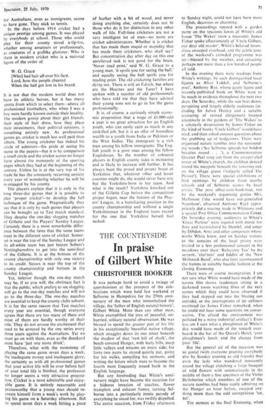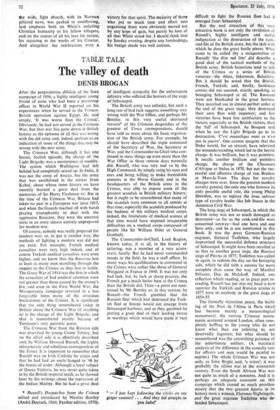THE COUNTRYSIDE
In praise of Gilbert White
CHRISTOPHER BOOKER
It was perhaps hard to avoid a twinge of apprehension at the prospect of the cele- brations which were held last weekend at Selborne in Hampshire for the 250th anni- versary of the man who immortalised the village, the 'father of English natural history', Gilbert White. More than any other man, White exemplified the joys of peaceful, un- hurried, solitary natural observation. He was blessed to spend the greater part of his life in his exceptionally beautiful native village, which straggles down its one street beneath the shadow of that 'vast hill of chalk', the beech-covered Hanger, with leafy hills, steep little valleys and streams on every side; for forty-two years he stayed quietly put, going for his walks, compiling his sermons, and writing the letters which were to become the fourth most frequently issued book in the English language.
But any foreboding that White's anni- versary might have become the occasion for a hideous invasion of coaches, flower tramplers and exhaust fumes, turning Sel- borne into a particularly ironic parody of everything he stood for, was swiftly dispelled. The entire occasion, from Friday afternoon to Sunday night, could not have been more English, decorous or charming.
The proceedings opened with a garden party on the spacious lawns of White's old house 'The Wakes' (now a museum). James Fisher spoke affectionately of 'Uncle Gilbert. our dear old master', White's beloved hirun- dines swooped overhead, and the gentle tone of the weekend's crowded programme was set—blessed by the weather, and attracting perhaps not more than a few hundred people all told.
In the evening there were readings from White's writings, by such distinguished local figures as Alvar Liddell, and 'Selborne's poet', Anthony Rye, whose gaunt figure and recently-published book on White were to be much in evidence throughout the next two days. On Saturday. while the sun beat down, perspiring and largely elderly audiences (in- cluding Sir Julian Huxley and a suitable scattering of retired clergymen) listened attentively in the gardens of 'The Wakes' to a scholarly dissertation by James Fisher on the kind of books 'Uncle Gilbert' would have read, and then asked anxious questions about the grubbing up of hedgerows. There were organised nature rambles into the surround- ing woods ('See Selborne spreads her boldest beauties round . . .'), a Commemoration Quarter Peal rang out from the creeper-clad tower of White's church, the children danced round the maypole beneath the towering oak on the village green ('vulgarly called The Plestor'). There were special exhibitions of bird paintings by children from nearby schools and of Selborne scenes by local artists. The post office-cum-bookshop, run by the weekend's organising genius Mrs. Mallinson ('she would have out-generalled Napoleon', observed Anthony Rye) appro- priately did a roaring trade in Whiteana and a special Post Office Commemoration Cover. On Saturday evening, audiences in White's 'Great Parlour' were regaled with music for flute and harpsichord by Handel, and songs by Dibden, Arne and other composers whose works White knew, and on Sunday visitors to the remains of the local priory were treated to a less professional concert in the meadows over their 'Refectory Tea' by the serpent, 'clar'nets' and fiddles of the 'New Mel'stock Band', who also later accompanied the hymns in suitably bucolic fashion at the closing Evensong.
There were of course incongruities. I am not sure what White would have made of the nature film shows (audiences sitting in a darkened room watching films of the very scenes which they could have observed if they had stepped out into the blazing sun outside), or the interruptions of jet airliners overhead (as James Fisher remarked, when he could not hear some questions on conser- vation, 'I'm afraid the environment was polluted by a noisy industrial artifact'). Even less am I sure what a ploughman of White's day would have made of the remark over- heard in the bar of the Queen's Hotel, 'your ploughman's lunch and the change from your 10s'.
But the general air of the occasion was so genial (with everyone greeting everybody else by Sunday evening as old friends) that even the lady who wandered innocently round the village clutching a large bouquet of wild flowers with ostentatiously in the middle of them a fine specimen of the Violet Helleborine which members of one of the nature rambles had been raptly admiring on the Hanger an hour before, escaped any- thing more than the odd surreptitious 'tut, tut'.
The sermon at the final Evensong, when the wide, light church, with its Norman pillared nave, was packed to overflowing, laid emphasis both on White's unfailing Christian humanity to his fellow villagers, and on the source of all his love for nature, his rejoicing in the works of his Creator. And altogether the celebrations were a victory for that spirit. The majority of those who put so much time and effort into organising them were obviously moved not by any hope of gain, but purely by love of all that White stood for. I should think that by Sunday evening, despite any forebodings, his benign shade was well content.































 Previous page
Previous page